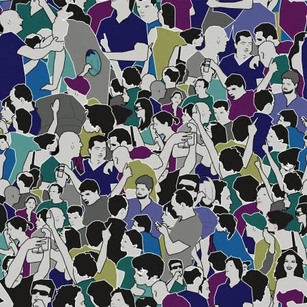
It’s easy to read right over simple verses like this in the New Testament and not notice things.
First, it’s easy to miss what is actually said – that Jesus didn’t just have compassion on the sick in the multitude, he had compassion on the whole crowd which led to his intervening wherever there was a need.
That means that Jesus didn’t just see and have compassion on the noticeable members of the crowd – the blind, the lame and those clearly afflicted with diseases and problems. It means he had compassion on the ones who were helping carry the lame, lead the blind and support the weak. It means he had compassion on the ones we might not notice as readily in a crowd – the shy, the grieving, the lonely and the discouraged.
Second, it’s easy – of course – not to see what’s not said. When we read the accounts of Jesus’ works we tend to read them in a vacuum, but we have to remember how much the Gospel writers are summarizing each incident. When Jesus had compassion on the crowds we get only the highlights of the healings – a kind of Gospel triage in which the most important healings and significant signs were recorded. But in having compassion on the crowds – not just the sick in the crowds – would Jesus not have noticed people with less obvious problems and had compassion on them also?
Surely Jesus saw the loneliness in the eyes of some and, having compassion, offered them a warm and accepting smile. Surely he saw the discouragement in the faces of others (Luke 18:24) and offered a few words of encouragement. In every case in the New Testament where we are told Jesus had compassion on people, he followed it with action; and having compassion on the crowds doubtless meant he interacted with and helped many more than the few people on whom he performed miracles of healing.
Perhaps we may feel we do not interact with crowds in the same way, but the totality of people we see and pass by as well as those we actually meet and with whom we interact in a day is often a small crowd, and for some of us a large one. If we are followers of Jesus, do we have compassion on that daily “crowd”? Do we seek to encourage and to smile, to check that people are all right? These may seem like small things and may seem hard to do in our over-crowded and impersonal world. But following in Christ’s footsteps means doing the things he did to the extent we can.
We know that God pays attention and knows the hairs on our heads, though we don’t tend to think of that in perspective of the teeming world of billions in which we live. But God does see every face in the crowd, and in his physical life the Son of God doubtless did his best to do so also. We are not just a face in the crowd to God, and no one in the crowd should be just a face to us.
 RSS Feed
RSS Feed
